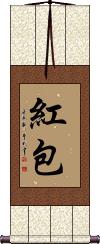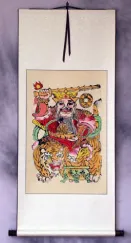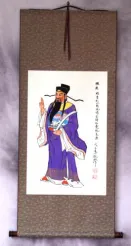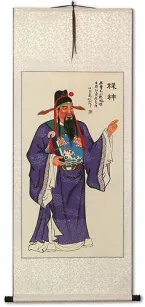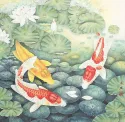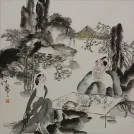Many custom options...
And formats...

Not what you want?
Try other similar-meaning words, fewer words, or just one word.
Time is Money in Chinese / Japanese...
Buy a Time is Money calligraphy wall scroll here!
Personalize your custom “Time is Money” project by clicking the button next to your favorite “Time is Money” title below...
Time is Money
Time is Gold
Red Envelope
紅包 literally means “red treasure.”
Depending on the context, it can also mean “money wrapped in red as a gift,” “a bonus payment,” “a kickback,” or “a bribe.”
However, most of the time, this is an innocent gift of money in a red envelope that is given from an elder relative to a youngster. This usually happens during the Chinese New Year. It can also happen in preparation for or during a wedding in China.
紅包 is pronounced “Hong Bao” (with an “oh” vowel sound on hong) in Mandarin Chinese. Filipino Chinese call it “Ang Pao.” There are a few other variations.
This in-stock artwork might be what you are looking for, and ships right away...
Gallery Price: $108.00
Your Price: $59.88
Gallery Price: $108.00
Your Price: $59.88
Lu Xing
God Of Money & Prosperity
Wall Scroll
Discounted Blemished
Gallery Price: $71.00
Your Price: $39.00
Gallery Price: $60.00
Your Price: $36.88
Gallery Price: $60.00
Your Price: $39.88
Gallery Price: $61.00
Your Price: $33.88
Gallery Price: $61.00
Your Price: $33.88
Gallery Price: $61.00
Your Price: $33.88
Gallery Price: $60.00
Your Price: $36.88
Gallery Price: $200.00
Your Price: $69.88
Gallery Price: $178.00
Your Price: $98.88
Not the results for Time is Money that you were looking for?
Below are some entries from our dictionary that may match your Time is Money search...
| Characters If shown, 2nd row is Simp. Chinese |
Pronunciation Romanization |
Simple Dictionary Definition |
花 see styles |
huā hua1 hua ririka りりか |
More info & calligraphy: Flower(1) flower; blossom; bloom; petal; (2) cherry blossom; (3) beauty; (4) blooming (esp. of cherry blossoms); (5) ikebana; (6) (abbreviation) Japanese playing cards; (7) (the) best; (female given name) Ririka 華 puṣpa, a flower, flowers; especially the lotus, and celestial flowers. 花座 The lotus throne on which buddhas and bodhisattvas sit. |
一刻千金 see styles |
yī kè qiān jīn yi1 ke4 qian1 jin1 i k`o ch`ien chin i ko chien chin ikkokusenkin いっこくせんきん |
More info & calligraphy: Time is Gold(expression) (yoji) every moment is precious; time is money; precious time |
時は金なり see styles |
tokihakanenari ときはかねなり |
More info & calligraphy: Time is Money |
摘 see styles |
zhāi zhai1 chai |
to take; to pick (flowers, fruit etc); to pluck; to remove; to take off (glasses, hat etc); to select; to pick out; to borrow money at a time of urgent need |
爰 see styles |
yuán yuan2 yüan koko ここ |
therefore; consequently; thus; hence; thereupon; it follows that; where?; to change (into); ancient unit of weight and money (1) (kana only) here (place physically close to the speaker, place pointed by the speaker while explaining); this place; (2) these last (followed by a duration noun and a past sentence: time period before the present time of the speaker); (3) these next ... (followed by a duration noun and a non past sentence: time period after the present time of the speaker); the next ... |
下す see styles |
kudasu くだす orosu おろす |
(transitive verb) (1) to make a decision; to draw a conclusion; (2) to judge; to hand down a verdict; to pass sentence; (3) to let go down; to lower; (4) to do oneself; to do by oneself; (5) to beat; to defeat; (6) to have loose bowels; to have diarrhea; to pass excrement; (irregular okurigana usage) (transitive verb) (1) to take down (e.g. flag); to launch (e.g. boat); to drop; to lower (e.g. ladder); to let (a person) off; to unload; to discharge; (2) to drop off (a passenger from a vehicle); to let (a person) off; (3) to withdraw money from an account; (4) to wear (clothing) for the first time; (5) to fillet (e.g. a fish) |
使う see styles |
tsukau つかう |
(transitive verb) (1) to use (a thing, method, etc.); to make use of; to put to use; (2) to use (a person, animal, puppet, etc.); to employ; to handle; to manage; to manipulate; (3) to use (time, money, etc.); to spend; to consume; (4) to use (language); to speak |
割く see styles |
saku さく |
(transitive verb) (1) to cut up; to cleave; to cut open (esp. the abdomen); (2) to spare (time, money, etc.); to use part of something; (3) (archaism) to have a tattoo in the corner of one's eye |
懸る see styles |
kakaru かかる |
(v5r,vi) (1) (kana only) to take (a resource, e.g. time or money); (Godan verb with "ru" ending) (2) (kana only) to hang; (3) (kana only) to come into view; to arrive; (4) (kana only) to come under (a contract, a tax); (5) (kana only) to start (engines, motors); (6) (kana only) to attend; to deal with; to handle; (v5r,aux-v) (7) (kana only) to have started to; to be on the verge of; (Godan verb with "ru" ending) (8) (kana only) to overlap (e.g. information in a manual); to cover; (v5r,aux-v) (9) (kana only) to (come) at; (Godan verb with "ru" ending) (10) (kana only) to be fastened; (11) (kana only) to be covered (e.g. with dust, a table-cloth, etc.); (12) (kana only) to be caught in; (13) (kana only) to get a call; (14) (kana only) to depend on |
折騰 折腾 see styles |
zhē teng zhe1 teng5 che t`eng che teng |
to toss from side to side (e.g. sleeplessly); to repeat something over and over again; to torment sb; to play crazy; to squander (time, money) |
挪借 see styles |
nuó jiè nuo2 jie4 no chieh |
to borrow money for a short time |
掛る see styles |
kakaru かかる |
(v5r,vi) (1) (kana only) to take (a resource, e.g. time or money); (Godan verb with "ru" ending) (2) (kana only) to hang; (3) (kana only) to come into view; to arrive; (4) (kana only) to come under (a contract, a tax); (5) (kana only) to start (engines, motors); (6) (kana only) to attend; to deal with; to handle; (v5r,aux-v) (7) (kana only) to have started to; to be on the verge of; (Godan verb with "ru" ending) (8) (kana only) to overlap (e.g. information in a manual); to cover; (v5r,aux-v) (9) (kana only) to (come) at; (Godan verb with "ru" ending) (10) (kana only) to be fastened; (11) (kana only) to be covered (e.g. with dust, a table-cloth, etc.); (12) (kana only) to be caught in; (13) (kana only) to get a call; (14) (kana only) to depend on |
施す see styles |
hodokosu ほどこす |
(transitive verb) (1) to give (time, money, goods); to donate; (transitive verb) (2) to do; to perform; to conduct; (transitive verb) (3) to apply (processing, makeup, etc.); to add (e.g. ornamentation, annotation); (transitive verb) (4) to sow; to seed; to scatter (e.g. fertilizer); to sprinkle; (transitive verb) (5) (archaism) to spread far and wide |
浮く see styles |
uku うく |
(v5k,vi) (1) to float; (v5k,vi) (2) (See 浮かぬ顔) to become merry; to be cheerful; (v5k,vi) (3) to become loose; to become unsteady; (v5k,vi) (4) (colloquialism) to feel out of it; to be cut off (e.g. from those around you); to feel out of place; (v5k,vi) (5) to be frivolous; to be uncertain; (v5k,vi) (6) to have (time, money, etc.) left over; to be saved (e.g. money); (v5k,vi) (7) to have no basis; to be unreliable |
省得 see styles |
shěng de sheng3 de5 sheng te |
to avoid; so as to save (money or time) |
破費 破费 see styles |
pò fèi po4 fei4 p`o fei po fei |
to spend (money or time) |
稼ぐ see styles |
kasegu かせぐ |
(transitive verb) (1) to earn (income); to make (money); (transitive verb) (2) to score (points, victory); to gain (time); to play (for time); (v5g,vi) (3) to work hard (at one's job); to labor; to labour; to toil |
花掉 see styles |
huā diào hua1 diao4 hua tiao |
to spend (time, money); to waste |
花費 花费 see styles |
huā fèi hua1 fei4 hua fei |
expense; cost; to spend (time or money); expenditure |
遣う see styles |
tsukau つかう |
(transitive verb) (1) to use (a thing, method, etc.); to make use of; to put to use; (2) to use (a person, animal, puppet, etc.); to employ; to handle; to manage; to manipulate; (3) to use (time, money, etc.); to spend; to consume; (4) to use (language); to speak |
下ろす see styles |
orosu おろす |
(transitive verb) (1) to take down (e.g. flag); to launch (e.g. boat); to drop; to lower (e.g. ladder); to let (a person) off; to unload; to discharge; (2) to drop off (a passenger from a vehicle); to let (a person) off; (3) to withdraw money from an account; (4) to wear (clothing) for the first time; (5) to fillet (e.g. a fish) |
懸かる see styles |
kakaru かかる |
(v5r,vi) (1) (kana only) to take (a resource, e.g. time or money); (Godan verb with "ru" ending) (2) (kana only) to hang; (3) (kana only) to come into view; to arrive; (4) (kana only) to come under (a contract, a tax); (5) (kana only) to start (engines, motors); (6) (kana only) to attend; to deal with; to handle; (v5r,aux-v) (7) (kana only) to have started to; to be on the verge of; (Godan verb with "ru" ending) (8) (kana only) to overlap (e.g. information in a manual); to cover; (v5r,aux-v) (9) (kana only) to (come) at; (Godan verb with "ru" ending) (10) (kana only) to be fastened; (11) (kana only) to be covered (e.g. with dust, a table-cloth, etc.); (12) (kana only) to be caught in; (13) (kana only) to get a call; (14) (kana only) to depend on |
懸ける see styles |
kakeru かける |
(transitive verb) (1) (kana only) to hang (e.g. picture); to hoist (e.g. sail); to raise (e.g. flag); (2) (kana only) to sit; (3) (kana only) to take (time, money); to expend (money, time, etc.); (4) (kana only) to make (a call); (5) (kana only) to multiply; (6) (kana only) to secure (e.g. lock); (7) (kana only) to put on (glasses, etc.); (8) (kana only) to cover; (9) (kana only) to burden someone; (10) (kana only) to apply (insurance); (11) (kana only) to turn on (an engine, etc.); to set (a dial, an alarm clock, etc.); (12) (kana only) to put an effect (spell, anaesthetic, etc.) on; (13) (kana only) to hold an emotion for (pity, hope, etc.); (14) (kana only) to bind; (15) (kana only) to pour (or sprinkle, spray, etc.) onto; (16) (kana only) to argue (in court); to deliberate (in a meeting); to present (e.g. idea to a conference, etc.); (17) (kana only) to increase further; (18) (kana only) to catch (in a trap, etc.); (19) (kana only) to set atop; (20) (kana only) to erect (a makeshift building); (21) (kana only) to hold (a play, festival, etc.); (22) (kana only) to wager; to bet; to risk; to stake; to gamble; (suf,v1) (23) (kana only) to be partway doing ...; to begin (but not complete) ...; to be about to ...; (24) (kana only) indicates (verb) is being directed to (someone) |
掛かる see styles |
kakaru かかる |
(v5r,vi) (1) (kana only) to take (a resource, e.g. time or money); (Godan verb with "ru" ending) (2) (kana only) to hang; (3) (kana only) to come into view; to arrive; (4) (kana only) to come under (a contract, a tax); (5) (kana only) to start (engines, motors); (6) (kana only) to attend; to deal with; to handle; (v5r,aux-v) (7) (kana only) to have started to; to be on the verge of; (Godan verb with "ru" ending) (8) (kana only) to overlap (e.g. information in a manual); to cover; (v5r,aux-v) (9) (kana only) to (come) at; (Godan verb with "ru" ending) (10) (kana only) to be fastened; (11) (kana only) to be covered (e.g. with dust, a table-cloth, etc.); (12) (kana only) to be caught in; (13) (kana only) to get a call; (14) (kana only) to depend on |
掛ける see styles |
kakeru かける |
(transitive verb) (1) (kana only) to hang (e.g. picture); to hoist (e.g. sail); to raise (e.g. flag); (2) (kana only) to sit; (3) (kana only) to take (time, money); to expend (money, time, etc.); (4) (kana only) to make (a call); (5) (kana only) to multiply; (6) (kana only) to secure (e.g. lock); (7) (kana only) to put on (glasses, etc.); (8) (kana only) to cover; (9) (kana only) to burden someone; (10) (kana only) to apply (insurance); (11) (kana only) to turn on (an engine, etc.); to set (a dial, an alarm clock, etc.); (12) (kana only) to put an effect (spell, anaesthetic, etc.) on; (13) (kana only) to hold an emotion for (pity, hope, etc.); (14) (kana only) to bind; (15) (kana only) to pour (or sprinkle, spray, etc.) onto; (16) (kana only) to argue (in court); to deliberate (in a meeting); to present (e.g. idea to a conference, etc.); (17) (kana only) to increase further; (18) (kana only) to catch (in a trap, etc.); (19) (kana only) to set atop; (20) (kana only) to erect (a makeshift building); (21) (kana only) to hold (a play, festival, etc.); (22) (kana only) to wager; to bet; to risk; to stake; to gamble; (suf,v1) (23) (kana only) to be partway doing ...; to begin (but not complete) ...; to be about to ...; (24) (kana only) indicates (verb) is being directed to (someone) |
損する see styles |
sonsuru そんする |
(suru verb) (1) to lose (money, etc.); (suru verb) (2) to waste one's (time, etc.); to have one's efforts come to naught |
殺豬盤 杀猪盘 see styles |
shā zhū pán sha1 zhu1 pan2 sha chu p`an sha chu pan |
pig butchering scam (where the scammer builds trust with the victim over time, "fattening them up," before ultimately "slaughtering" them by taking their money); (esp.) romance scam |
線香代 see styles |
senkoudai / senkodai せんこうだい |
(1) money brought to a funeral; incense money; (2) fee for a geisha's time |
費える see styles |
tsuieru ついえる |
(v1,vi) (1) to be used up (of money, savings, etc.); to dwindle away; (v1,vi) (2) to be wasted (of time) |
這麼點 这么点 see styles |
zhè me diǎn zhe4 me5 dian3 che me tien |
such a small amount of (money, time etc) |
Click here for more Time is Money results from our dictionary
The following table may be helpful for those studying Chinese or Japanese...
| Title | Characters | Romaji (Romanized Japanese) | Various forms of Romanized Chinese | |
| Time is Money | 時は金なり | toki wa kane nari tokiwakanenari | ||
| Time is Gold | 一刻千金 | ikko ku sen kin ikkokusenkin iko ku sen kin | yī kè qiān jīn yi1 ke4 qian1 jin1 yi ke qian jin yikeqianjin | i k`o ch`ien chin ikochienchin i ko chien chin |
| Red Envelope | 紅包 红包 | hóng bāo / hong2 bao1 / hong bao / hongbao | hung pao / hungpao | |
| In some entries above you will see that characters have different versions above and below a line. In these cases, the characters above the line are Traditional Chinese, while the ones below are Simplified Chinese. | ||||
Successful Chinese Character and Japanese Kanji calligraphy searches within the last few hours...


